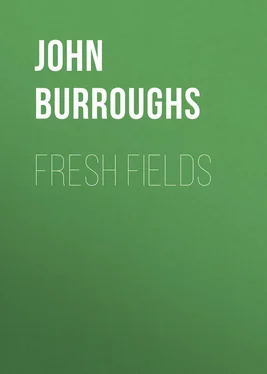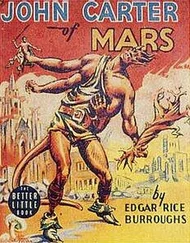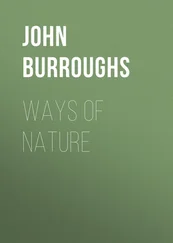John Burroughs - Fresh Fields
Здесь есть возможность читать онлайн «John Burroughs - Fresh Fields» — ознакомительный отрывок электронной книги совершенно бесплатно, а после прочтения отрывка купить полную версию. В некоторых случаях можно слушать аудио, скачать через торрент в формате fb2 и присутствует краткое содержание. Жанр: foreign_antique, foreign_prose, Историческая проза, на английском языке. Описание произведения, (предисловие) а так же отзывы посетителей доступны на портале библиотеки ЛибКат.
- Название:Fresh Fields
- Автор:
- Жанр:
- Год:неизвестен
- ISBN:нет данных
- Рейтинг книги:3 / 5. Голосов: 1
-
Избранное:Добавить в избранное
- Отзывы:
-
Ваша оценка:
- 60
- 1
- 2
- 3
- 4
- 5
Fresh Fields: краткое содержание, описание и аннотация
Предлагаем к чтению аннотацию, описание, краткое содержание или предисловие (зависит от того, что написал сам автор книги «Fresh Fields»). Если вы не нашли необходимую информацию о книге — напишите в комментариях, мы постараемся отыскать её.
Fresh Fields — читать онлайн ознакомительный отрывок
Ниже представлен текст книги, разбитый по страницам. Система сохранения места последней прочитанной страницы, позволяет с удобством читать онлайн бесплатно книгу «Fresh Fields», без необходимости каждый раз заново искать на чём Вы остановились. Поставьте закладку, и сможете в любой момент перейти на страницу, на которой закончили чтение.
Интервал:
Закладка:
Among our own poets, two at least of the more eminent have listened to the siren of our primitive woods. I refer to Bryant and Emerson. Though so different, there is an Indian's love of forests and forest-solitudes in them both. Neither Bryant's "Forest Hymn" nor Emerson's "Woodnotes" could have been written by an English poet. The "Woodnotes" savor of our vast Northern pine forests, amid which one walks with distended pupil, and a boding, alert sense.
"In unploughed Maine he sought the lumberers' gang,
Where from a hundred lakes young rivers sprang;
He trode the unplanted forest floor, whereon
The all-seeing sun for ages hath not shone;
Where feeds the moose, and walks the surly bear,
And up the tall mast runs the woodpecker.
He saw beneath dim aisles, in odorous beds,
The slight Linnæa hang its twin-born heads,
And blessed the monument of the man of flowers,
Which breathes his sweet fame through the northern bowers.
He heard, when in the grove, at intervals,
With sudden roar the aged pine-tree falls, —
One crash, the death-hymn of the perfect tree,
Declares the close of its green century."
Emerson's muse is urbane, but it is that wise urbanity that is at home in the woods as well as in the town, and can make a garden of a forest.
"My garden is a forest ledge,
Which older forests bound;
The banks slope down to the blue lake-edge,
Then plunge to depths profound."
On the other hand, we have no pastoral poetry in the English sense, because we have no pastoral nature as overpowering as the English have. When the muse of our poetry is not imitative, it often has a piny, woodsy flavor, that is unknown in the older literatures. The gentle muse of Longfellow, so civil, so cultivated; yet how it delighted in all legends and echoes and Arcadian dreams, that date from the forest primeval. Thoreau was a wood-genius – the spirit of some Indian poet or prophet, graduated at Harvard College, but never losing his taste for the wild. The shy, mystical genius of Hawthorne was never more at home than when in the woods. Read the forest-scenes in the "Scarlet Letter." They are among the most suggestive in the book.
III
IN CARLYLE'S COUNTRY
In crossing the sea a second time, I was more curious to see Scotland than England, partly because I had had a good glimpse of the latter country eleven years before, but largely because I had always preferred the Scotch people to the English (I had seen and known more of them in my youth), and especially because just then I was much absorbed with Carlyle, and wanted to see with my own eyes the land and the race from which he sprang.
I suspect anyhow I am more strongly attracted by the Celt than by the Anglo-Saxon; at least by the individual Celt. Collectively the Anglo-Saxon is the more impressive; his triumphs are greater; the face of his country and of his cities is the more pleasing; the gift of empire is his. Yet there can be no doubt, I think, that the Celts, at least the Scotch Celts, are a more hearty, cordial, and hospitable people than the English; they have more curiosity, more raciness, and quicker and surer sympathies. They fuse and blend readily with another people, which the English seldom do. In this country John Bull is usually like a pebble in the clay; grind him and press him and bake him as you will, he is still a pebble – a hard spot in the brick, but not essentially a part of it.
Every close view I got of the Scotch character confirmed my liking for it. A most pleasant episode happened to me down in Ayr. A young man whom I stumbled on by chance in a little wood by the Doon, during some conversation about the birds that were singing around us, quoted my own name to me. This led to an acquaintance with the family and with the parish minister, and gave a genuine human coloring to our brief sojourn in Burns's country. In Glasgow I had an inside view of a household a little lower in the social scale, but high in the scale of virtues and excellences. I climbed up many winding stone stairs and found the family in three or four rooms on the top floor: a father, mother, three sons, two of them grown, and a daughter, also grown. The father and the sons worked in an iron foundry near by. I broke bread with them around the table in the little cluttered kitchen, and was spared apologies as much as if we had been seated at a banquet in a baronial hall. A Bible chapter was read after we were seated at table, each member of the family reading a verse alternately. When the meal was over, we went into the next room, where all joined in singing some Scotch songs, mainly from Burns. One of the sons possessed the finest bass voice I had ever listened to. Its power was simply tremendous, well tempered with the Scotch raciness and tenderness, too. He had taken the first prize at a public singing bout, open to competition to all of Scotland. I told his mother, who also had a voice of wonderful sweetness, that such a gift would make her son's fortune anywhere, and found that the subject was the cause of much anxiety to her. She feared lest it should be the ruination of him – lest he should prostitute it to the service of the devil, as she put it, rather than use it to the glory of God. She said she had rather follow him to his grave than see him in the opera or concert hall, singing for money. She wanted him to stick to his work, and use his voice only as a pious and sacred gift. When I asked the young man to come and sing for us at the hotel, the mother was greatly troubled, as she afterward told me, till she learned we were stopping at a temperance house. But the young man seemed not at all inclined to break away from the advice of his mother. The other son had a sweetheart who had gone to America, and he was looking longingly thitherward. He showed me her picture, and did not at all attempt to conceal from me, or from his family, his interest in the original. Indeed, one would have said there were no secrets or concealments in such a family, and the thorough unaffected piety of the whole household, mingled with so much that was human and racy and canny, made an impression upon me I shall not soon forget. This family was probably an exceptional one, but it tinges all my recollections of smoky, tall-chimneyed Glasgow.
A Scotch trait of quite another sort, and more suggestive of Burns than of Carlyle, was briefly summarized in an item of statistics which I used to read in one of the Edinburgh papers every Monday morning, namely, that of the births registered during the previous week, invariably from ten to twelve per cent. were illegitimate. The Scotch – all classes of them – love Burns deep down in their hearts, because he has expressed them, from the roots up, as none other has.
When I think of Edinburgh the vision that comes before my mind's eye is of a city presided over, and shone upon as it were, by two green treeless heights. Arthur's Seat is like a great irregular orb or half-orb, rising above the near horizon there in the southeast, and dominating city and country with its unbroken verdancy. Its greenness seems almost to pervade the air itself – a slight radiance of grass, there in the eastern skies. No description of Edinburgh I had read had prepared me for the striking hill features that look down upon it. There is a series of three hills which culminate in Arthur's Seat, 800 feet high. Upon the first and smaller hill stands the Castle. This is a craggy, precipitous rock, on three sides, but sloping down into a broad gentle expanse toward the east, where the old city of Edinburgh is mainly built, – as if it had flowed out of the Castle as out of a fountain, and spread over the adjacent ground. Just beyond the point where it ceases rise Salisbury Crags to a height of 570 feet, turning to the city a sheer wall of rocks like the Palisades of the Hudson. From its brink eastward again, the ground slopes in a broad expanse of greensward to a valley called Hunter's Bog, where I thought the hunters were very quiet and very numerous until I saw they were city riflemen engaged in target practice; thence it rises irregularly to the crest of Arthur's Seat, forming the pastoral eminence and green-shining disk to which I have referred. Along the crest of Salisbury Crags the thick turf comes to the edge of the precipices, as one might stretch a carpet. It is so firm and compact that the boys cut their initials in it, on a large scale, with their jack-knives, as in the bark of a tree. Arthur's Seat was a favorite walk of Carlyle's during those gloomy days in Edinburgh in 1820-21. It was a mount of vision to him, and he apparently went there every day when the weather permitted.[Note: See letter to his brother John, March 9, 1821.
Читать дальшеИнтервал:
Закладка:
Похожие книги на «Fresh Fields»
Представляем Вашему вниманию похожие книги на «Fresh Fields» списком для выбора. Мы отобрали схожую по названию и смыслу литературу в надежде предоставить читателям больше вариантов отыскать новые, интересные, ещё непрочитанные произведения.
Обсуждение, отзывы о книге «Fresh Fields» и просто собственные мнения читателей. Оставьте ваши комментарии, напишите, что Вы думаете о произведении, его смысле или главных героях. Укажите что конкретно понравилось, а что нет, и почему Вы так считаете.












